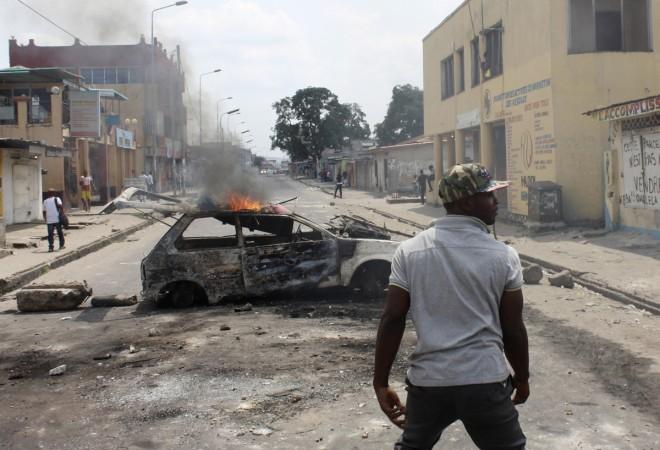
Protests erupted for a second day in Democratic Republic of Congo on Tuesday over proposed changes to an election law that could delay a vote due in 2016 and allow President Joseph Kabila to stay in power.
Foreign powers called for restraint and timely elections.
Police fired shots in the air as students burned tires and set up barricades at Kinshasa University, while large crowds also occupied the airport road. Witnesses said the violence had degenerated into looting in many places by the afternoon.
Kabila came to power when his father was shot dead in 2001 and won elections in 2006 and 2011. The constitution bars him from standing for a third term in next year's ballot.
However, in a move critics say is aimed at prolonging his stay in office, the government wants to revise the electoral law and order a census before any vote.
Kabila's allies say this task could be completed within a year, but opponents argue that it will take far longer in a nation the size of Western Europe, which has little infrastructure and poor communications.
The government proposal was adopted by the lower house at the weekend. The Senate discussed the bill on Tuesday and members voted to send the legislation to a commission that will examine any proposed amendments.
"The combat won't stop until they withdraw this law," a law student at the university told Reuters, asking not to be named.
"We think that the message has been delivered and that President Kabila will respect it."
Riot police and soldiers from the presidential guard deployed across the city, but protests appeared to be less organized and more sporadic than on Monday, when at least four people died in clashes.
Witnesses said Chinese and Indian owned shops in the Masina and Ndjili neighborhoods had been targeted by looters.
SMS services for mobile phones, Wi-Fi and mobile internet were all down in Kinshasa on the orders of the government, a diplomat and an employee at a mobile phone network said. There was no immediate comment from the government.
Air France canceled its flight due to the insecurity.
Congo's economy has long been crippled by mismanagement, corruption and two decades of armed conflict in the country's eastern borderlands. But investors have long been attracted to its largely undeveloped mineral reserves.
Alongside appeals for restraint, Tuesday saw more warnings from foreign powers against delaying Congo's vote.
Belgian Foreign Minister Didier Reynders called for the constitution to be respected and expressed in a statement his "concern about a possible shift in the electoral calendar as a consequence of the plan to conduct a census".
France's foreign ministry said it was essential the electoral calendar be agreed in a consensual fashion.
Russ Feingold, the U.S. envoy to the Great Lakes region, called for "peaceful, credible, and timely elections" in Congo.
In another sign of political tension, opposition leader Jean-Claude Muyambo was arrested.
Muyambo defected last November from Kabila's ruling coalition. Government spokesman Lambert Mende said his arrest was ordered by the public prosecutor's office after a complaint about a real estate sale and had "no link to political issues".


!['Kaise ho bhai..': PM Modi shook hands with Akshay Kumar at a media summit in Delhi [Watch] 'Kaise ho bhai..': PM Modi shook hands with Akshay Kumar at a media summit in Delhi [Watch]](https://data1.ibtimes.co.in/en/full/806317/kaise-ho-bhai-pm-modi-shook-hands-akshay-kumar-media-summit-delhi-watch.jpg?w=220&h=135&l=50&t=40)


!['Kaise ho bhai..': PM Modi shook hands with Akshay Kumar at a media summit in Delhi [Watch]](https://data1.ibtimes.co.in/en/full/806317/kaise-ho-bhai-pm-modi-shook-hands-akshay-kumar-media-summit-delhi-watch.jpg?w=220&h=138)








!['Kaise ho bhai..': PM Modi shook hands with Akshay Kumar at a media summit in Delhi [Watch]](https://data1.ibtimes.co.in/en/full/806317/kaise-ho-bhai-pm-modi-shook-hands-akshay-kumar-media-summit-delhi-watch.jpg?w=220&h=135)


